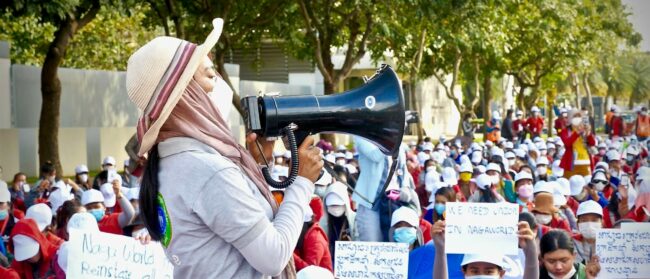Tourism is inseparable from travel. As such, the recovery of the tourism industry is directly connected to freedom of movement. With Malaysia reopening interstate travel on October 11 and the launch of the international tourism bubble and Vaccinated Travel Lane (VTL) in November, the recovery of the local tourism sector has gradually been picking up.
Malaysia’s Tourism, Arts and Culture Minister Nancy Shukri believes that with Malaysia on the road to becoming one of the countries in the world with the best vaccination rates in the world, the Langkawi International Tourism Bubble and Vaccinated Travel Lane (VTL) can potentially attract foreign tourists.
“We hope that with the gradual reopening of borders such as the Langkawi International Tourism Bubble (LITB) on 15 November 2021, and the Malaysia-Singapore Vaccinated Travel Lane (VTL) on 29 November 2021, we will not only see an increase in tourists and tourism revenue but also help us inch closer to the complete reopening of our borders to foreign tourists.”
In a written reply to a question from an Oriental Daily reporter, Nancy pointed out that as of December 21, 2021, over 600,000 domestic and foreign tourists have visited Langkawi with tourism revenue reaching RM640 million.
As of December 22, 2021, 1,089 tourists have visited Langkawi via the tourism bubble including tourists from the United Kingdom, the United States, Australia, China, Germany, Indonesia and Thailand.
She also said that as of December 13, 2021, the Malaysia-Singapore VTL for air travel has brought 15,864 tourists to Malaysia. Meanwhile as of December 18, 2021, 22,003 tourists have come to Malaysia via the Malaysia-Singapore VTL on land.
“We are looking forward to expanding the VTL to other ASEAN countries when the conditions permit.”

However, Malaysia and Singapore agreed to temporarily suspend the sale of airline and bus tickets for the VTL from December 23, 2021 to January 20, 2022 due to a cluster of infections believes to have been from the Omicron mutation in Singapore.
Nancy also mentioned that according to the report by the Malaysian Hotels Association, the average hotel occupancy rate in the third quarter of 2021 had increased to nearly 30% compared to that of the second quarter in the same year.
“The interstate travel ban was lifted on October 11 and the average (hotel) occupancy rate has risen steadily to 45% in November.”
She said that this was a good indicator of recovery and that given our international borders are still closed, it means that locals are beginning to adapt to the new normal in tourism.
She said that MOTAC is working on numerous strategies to boost domestic tourism including incentivised programmes in the form of discounts with local airlines, the Malaysian Association of Hotels (MAH), rebates, gift voudhers as well as the purchase of cultural souvenirs.
“As of December 9, 2021, Malaysians have fully redeemed these rewards.”
While ttourists have started to travel under the conditions of the new normal, Nancy Shukri urges tourists to follow standard operating procedures (SOPs) while travelling to ensure that the number of Covid-19 cases remains low so that tourism activities can continue to open.
She pointed out that with the new coronavirus variant, the government will always be prepared to take all the necessary measures before fully reopening our borders.
Malaysia’s active participation in the recovery of tourism in ASEAN
Nancy Shukri added that on the road to ASEAN’s recovery, Malaysia has been actively participating in ASEAN-level discussions through the ASEAN National Tourism Organisation (NTO), its committees and working groups to propose mitigation and action plans in order to break the Covid-19 chain of infection and to continue the implementation of the ASEAN Tourism Strategic Plan (ATSP) from 2016 to 2025.
She pointed out that Malaysia is actively playing a key leadership role in executing strategic action plans on investment, sustainability and marketing matters under the ATSP, which in turn will enhance ASEAN’s competitiveness as a single tourism destination.
She said that Malaysia is also working closely with all relevant ASEAN sectoral agencies to effectively and completely implement recovery plans and action and to ensure that policies and guidelines are aligned in order to jointly tackle the Covid-19 outbreak.
How the pandemic changed travel patterns towards health and safety
When discussing changes in future travel plans during the pandemic, Nancy pointed out that future travel patterns will definitely change and that travellers’’ preferences and activities will shift towards familiar, predictable, trustable and low-risk destinations, such as domestic and regional resort destinations, outdoor activities and ecotourism attractions.
“Safe, uncrowded and comfortable destinations will have a surge in demand by travellers, giving rise to an opportunity to promote lesser-known destinations. Not only will this expand the economic benefits of tourism but also will solve the problem of crowds at popular attractions.”
In the aftermath of the pandemic, health and safety will become important factors in attracting tourists who prefer destinations with good infrastructure, proper medical facilities and compliance with standards for cleanliness, health and safety, she said.
Citing Tourism Malaysia’s survey on domestic travel in Malaysia last year, she said that most respondents are of the belief that Covid-19 had affected their travel behaviour.
“Almost all respondents put health and safety as a high priority in their travel decisions and would avoid travelling to crowded places. Most respondents prefer to arrange their own travel through online booking services.”
She believes that tourism operators must “dramatically” review their business processes to adjust and adapt to new travel patterns during the pandemic.
“Travellers are seeking further support to face changing circumstances and uncertainty. Travel operators are becoming more valuable and important in assisting travellers in making informed decisions.”
She suggested that tourism operators remain flexible and to engage more with consumers and other stakeholders in order to overcome challenges and make travel enjoyable again which will in turn, encourage more tourists to travel.
This article was originally published in Oriental Daily and is produced as part of the Seafore Masterclass project, with support from the Institute for War and Peace Reporting


